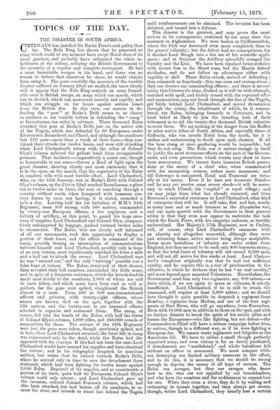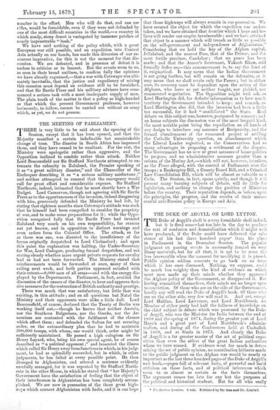TOPICS OF THE DAY.
THE DISASTER IN SOUTH AFRICA.
CETEWAY0 has justified Sir Bartle Frere's rash policy thus far. The Zulu King has shown that he possessed an army which could at any moment have swept Natal clear of its usual garrison, and probably have extirpated the white in- habitants of the colony, reducing the British Government to the necessity of a regular and complete reconquest. He had a most formidable weapon in his hand, and there was no reason to believe that whenever he chose, he would abstain from using it. The more carefully the accounts of the terrible disaster suffered on January 22nd are studied, the more clearly will it appear that the Zulu King controls an army formid- able even to British troops, an army which can march, which can be divided, which can manoeuvre secretly and rapidly, and which can struggle on for hours against serious losses from the British fire. In this view, our success in de- fending the " post" at Rorke's Drift seems to us almost as ominous as our terrible failure in defending the " camp " at Insandusana, ten miles in advance. Three thousand Zulus attacked this post at Rorke's Drift, just on the native side of the Tugela, which was defended by 80 Europeans, under Lieutenants Bromehead and Chard, and although the assailants lost 370 men—more than a tenth of their force—they con- tinued their attacks for twelve hours, and were still attacking when Lord Chelmsford's return with the relics of Colonel Glyn's column relieved the gallant band from insupportable pressure. That incident—comparatively a minor one, though so honourable to our arms—throws a flood of light upon the great disaster, showing clearly and most ominously that it is in the open, on the march, that the superiority of the Zulus in numbers tells with most terrible effect. Lord Chelmsford, who, on the 12th January, was at Rorke's Drift with Colonel Glyn's column, on the 21st or 22nd reached Insandusana, a place ten or twelve miles in front, the rate of marching through a country without roads, when hampered with immense con- voys drawn by oxen not having, it is stated, exceeded a mile a day. Leaving half the 1st battalion of H.M.'s 24th Regiment, some 500 strong, with 500 natives, commanded by twenty-one European officers, a few engineers, and a battery of artillery, at this point, to guard his huge cara- vans of supplies, Lord Chelmsford and Colonel Glyn, compara- tively unhampered by baggage, pushed forward twelve miles to reconnoitre. The Zulus, who are clearly well informed of all our movements, took this opportunity to display a portion of their force, and the officer in command of the camp, possibly fearing an interruption of communications between himself and Lord Chelmsford, possibly only in hope of an easy victory, most injudiciously marched his force a mile and a half out to attack the enemy. Lord Chelmsford says he was " enticed out," and the only " enticing " possible was a false hope of victory. The Zulus, overjoyed at their chance, then revealed their full numbers, surrounded the little army, and in spite of a desperate resistance, which the breech-loaders made most deadly to the assailants, 2,000 of whom are said to have fallen, and which must have been cool as well as gallant, for the guns were spiked, slaughtered the British almost to a man. From 500 to GOO non-commissioned officers and privates, with twenty-eight officers, whose names are known, died on the spot, together with the 500 natives, and the twenty-one as yet unnamed officers selected to organise and command them. The camp, of course, fell into the hands of the Zulus, with half the stores of Colonel Glyn's column, 1,000 rifles, and 240,000 rounds of ammunition for them. The colours of the 24th Regiment were lost, the guns were taken, though previously spiked, and in fact, when Lord Chelmsford returned, the force left in camp was represented only by the dead, while the Zulus had dis- appeared with the convoys. If this had not been the case, Lord Chelmsford would have rescued his supplies and have chastised the victors ; and in his telegraphic despatch he mentions neither, but states that he retired towards Rorke's Drift, where he arrived only in time to save the detachment there stationed, which had been fighting for twelve hours against 3,000 Zulus. Deprived of its supplies, and so considerable a portion of its force, quite half its Europeans, Colonel Glyn's column could only retreat ; and Lord Chelmsford gave up the invasion, ordered Colonel Pearson's column, which had also been attacked, but had beaten off its assailants, to re- cross the river, and intends to stand fast behind the Tugela until reinforcements can be obtained. The invasion has been, defeated, and turned into a defence.
This disaster is the greatest, and may prove the most serious in its consequences, sustained by our arms since the massacre in Afghanistan. We were beaten at Chillianwallah, where the 24th was destroyed even more completely than in the present calamity ; but the defeat had no consequences, for it shocked Lord Gough into a due use of his scientific appli- ances ; and at Goojerat the Artillery splendidly avenged the Cavalry and the Line. We have been repulsed twice or thrice with severe loss in the Maori wars, but the Maoris defend stockades, and do not follow up advantages either with rapidity or skill. These Zulus attack, instead of defending ; they outmarch us hopelessly ; they can cross and recross rivers ; they can deceive our commanding officers ; and there is no cer- tainty that Cetewayo's army, flushed as it will be with triumph, enriched with spoil, and freshly armed with the captured rifles and ammunition, may not break through the line of the Tugela,. get fairly behind Lord Chelmsford, and spread devastation through the colony, the inhabitants of which, be it remem- bered, are Zulus, belonging formerly to Cetewayo, and in local belief as likely to join the invading host of their tribesmen as to aid the twenty-five thousand British colonists to resist them. We say nothing of the danger from the Kaffirs or other native tribes of South Africa, and especially those of Caffraria, who can invade Natal from the south, for it is useless and embarrassing to dwell upon such chances. If all the bees stung at once, gardening would be impossible ; but they do not sting. The Zulu war is serious enough in itself to justify the most strenuous efforts on the part of the Govern- ment, and even precautions which events may show to have been unnecessary. We cannot leave immense British posses- sions at the mercy of a chief who, when remonstrated with for massacring women, orders more massacres ; and till Cetewayo is conquered, Natal and Transvaal are virtu- ally at his mercy. Even if he does not devastate Natal— and he may yet receive some severe check—it will be neces- sary to reach Ulundi, his " capital " or royal village ; and we may judge from what has already occurred, and from Secocceni's successful resistance to Lord Chelmsford, what kind of enterprise that will be. It will take, first and last, nearly as many men and as much treasure as the Abyssinian war,. and our main quarrel with the Government in their present action is that they even now appear to underrate the task which Sir Bartle Frere, with his sanguine rashness, so terribly undervalued. Her Majesty's 57th Regiment, now in Ceylon, will, of course, obey Lord Chelmsford's summons with an alacrity not altogether sorrowful, although they were just returning home, active service being always acceptable.. Seven more battalions of infantry are under orders from England, but they are said to be each only 800 bayonets strong,. so that the total force of infantry will not exceed 6,500 men,. and will not all arrive for five weeks at least. Lord Chelms- ford's complaint originally was that he had not sufficient cavalry, and he repeats this in a sort of proclamation to the colonists, in which he declares that he has " no real cavalry,' and must depend upon mounted Volunteers. Nevertheless, the Government send him only two regiments, say, 800 sabres,—a force which, if we are again to move in columns, lb utterly
insufficient. Lord Chelmsford, if he is still to retain the command, will require at least 2,000 sabres ; and we should have thought it quite possible to despatch a regiment from Bombay, a regiment from Madras, and one of the four regi- ments of Sind Horse, who will go anywhere, from Kurrachee. Even with 10,000 men in addition to those on the spot, and with no further disaster to break the spirit of his native allies and harass the Europeans—who like fighting, but not defeat—the Commander-in-Chief will have a serious campaign before him, as serious, though in a different way, as if he were fighting a. European foe. We cannot waste regiments and brigades as the Americans did. We have to utilise a small though perfectly organised army, and even victory is for us dearly purchased, if detachments are "annihilated," and whole battalions left without an officer to command. We must conquer with- out destroying our limited military resources in the effort, and to do this, it is necessary that we should be 'strong enough to deprive the enemy of all hope of success. The Zulus are savages, but they are savages who know how to die, who are not appalled by our breechloaders, and who have the numbers and the recklessness to expend four for one. When they cross a river, they do it by wading and swimming in masses together, and they always get across, though, writes. Lord Chelmsford, they usually lose a certain
number in the effort. Men who will do that, and can use rifles, would be formidable, even if they were not defended by one of the most difficult countries in the world,—a country in which sandy, stony desert is variegated by immense patches of nearly impenetrable " bush." We have said nothing of the policy which, with a great European war still possible, and an expedition into Central Asia actually on our hands, has made this diversion of our re- sources imperative, for this is not the moment for that dis- cussion. We are defeated, and in presence of defeat it is useless to criticise or to lament. But the events seem to us, as seen in their broad outlines, to confirm fully the opinions we have already expressed,—that a war with Cetewayo was ulti- mately inevitable, that the justice and expediency of seizing this occasion must depend on evidence still to be furnished, and that Sir Bartle Frere and his military advisers have com- menced a serious task with a most inadequate supply of men. The plain truth of the matter is that a policy so high-handed as that which the present Government professes, however insincerely, to follow, cannot be carried out without an army which, as yet, we do not possess.



































 Previous page
Previous page